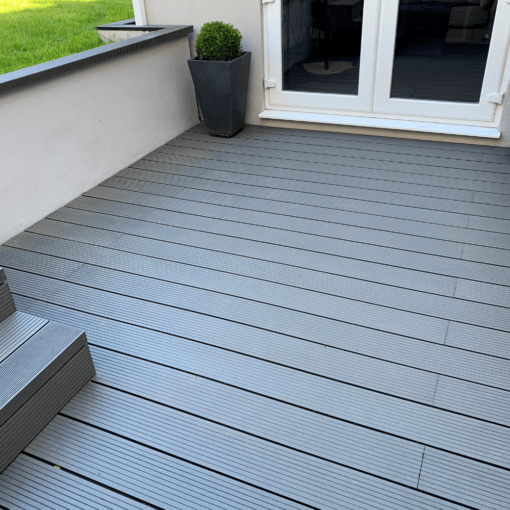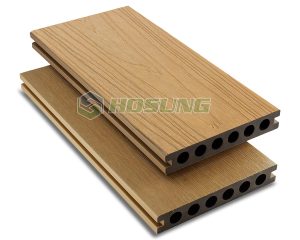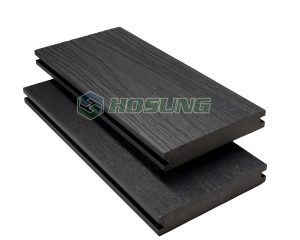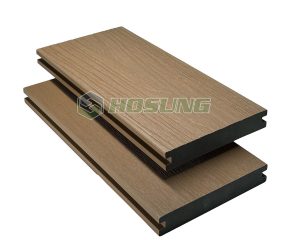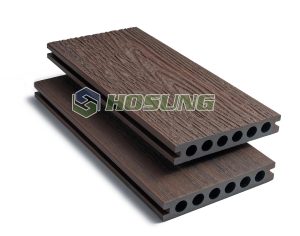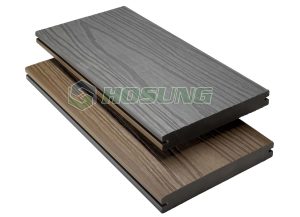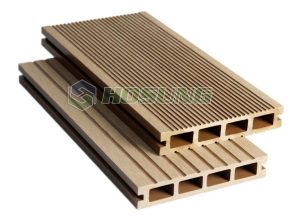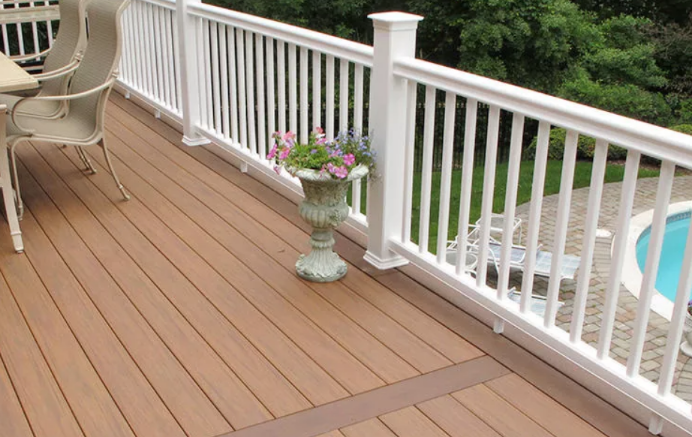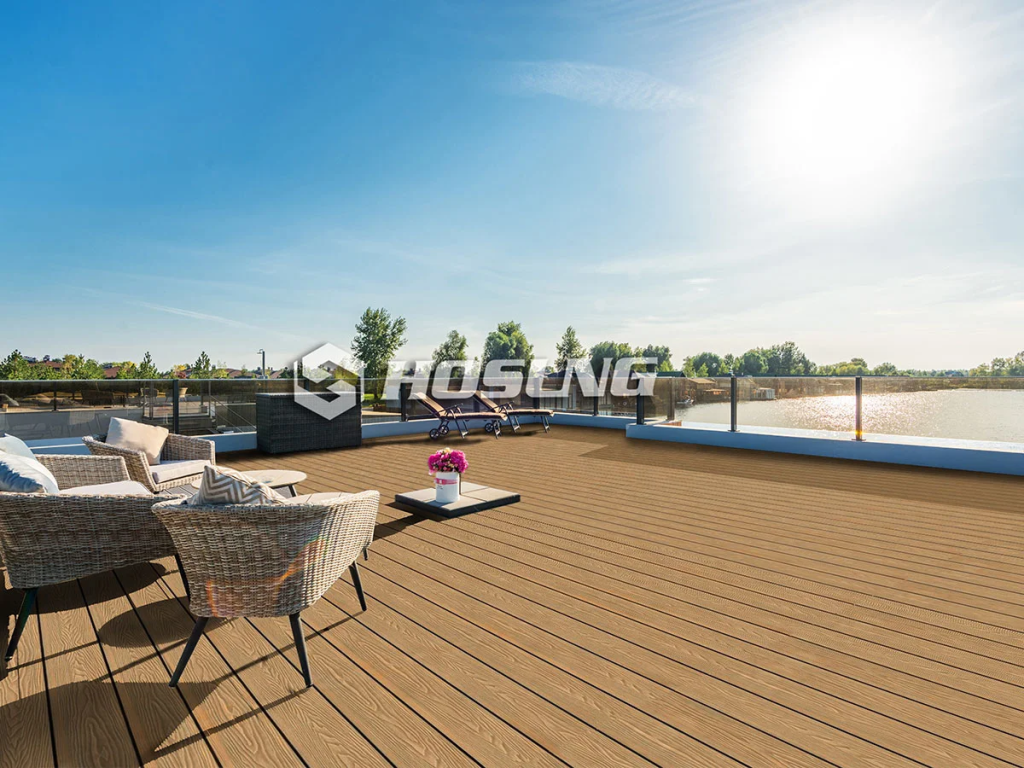In recent years, composite decking has become one of the most popular options for outdoor spaces across Canada. Known for its durability, low maintenance, and long-term value, composite decking offers a modern alternative to traditional wood structures. But before homeowners start designing their perfect backyard, one of the first questions that comes to mind is: How much does composite decking cost in Canada?
Table of Contents
What is Composite Decking?
Composite decking is a manufactured product made by combining wood fibers or flour with plastic polymers. The resulting material mimics the look and texture of wood but offers far greater resistance to rot, warping, moisture, and UV damage. Composite boards are typically capped with a protective layer that helps guard against fading, staining, and scratches.
For Canadian homeowners facing wide-ranging weather conditions—from heavy snowfall in Alberta to humidity in Ontario or coastal rain in British Columbia—composite decking delivers reliable performance year-round. Unlike pressure-treated lumber or cedar, composite materials do not require yearly sealing or staining, saving both time and money in the long run.
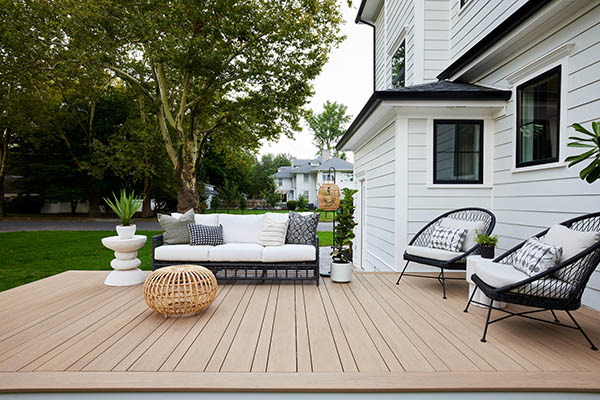
Average Composite Deck Price in Canada
The total cost of a composite deck depends on several variables. However, for general budgeting purposes, Canadian homeowners can expect the following average prices:
Material Cost Only: $8 – $15 CAD per square foot
Professional Installation: $10 – $18 CAD per square foot
Total Installed Cost: $18 – $33 CAD per square foot
This means that for a standard 300 square foot deck, the total investment typically falls between $5,400 and $9,900 CAD, depending on the quality of materials, labor rates, and complexity of design.
These figures are averages and should be adjusted based on the homeowner’s location and individual requirements.
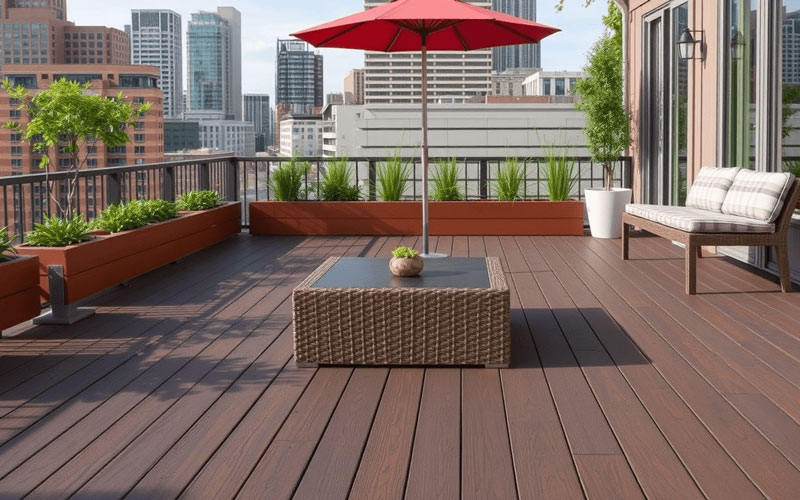
Key Factors That Affect Composite Deck Pricing
Composite decking offers a wide spectrum of customization options. That flexibility, however, comes with a range of pricing factors that can influence the total cost of your project. Below are the most common elements to consider:
1. Quality of Composite Material
Not all composite decking is created equal. Entry-level boards tend to be hollow or lightweight and may offer limited color options and warranties. Mid-range options provide enhanced durability, more color and grain variations, and better resistance to weather-related issues. Premium boards often feature thick capping layers, deep embossing, and fade-resistant finishes with extended warranties.
Naturally, as the material quality increases, so does the price per square foot. Homeowners must balance aesthetics, performance, and budget when selecting the most appropriate option.
2. Deck Size
The larger the deck, the more materials required and the greater the labor costs. While the price per square foot remains relatively consistent, total cost scales with area. A compact 200-square-foot deck might cost around $4,000–$6,000, whereas a spacious 600-square-foot entertainment platform could cost $12,000–$18,000 or more.
Homeowners should not only consider the immediate needs of the space but also future usability and resale value when deciding on deck size.
3. Deck Design and Complexity
Design plays a crucial role in determining the final price. A simple rectangular deck is straightforward to install and cost-efficient. On the other hand, multi-level decks, those with curved edges, integrated seating, or built-in lighting systems, require more materials, more time, and greater construction expertise.
Even minor design upgrades—like adding a set of stairs, a second tier, or a perimeter border—can raise the total project cost significantly.
4. Labor and Installation
Labor costs can vary depending on geographic location, time of year, and the contractor’s expertise. In major metropolitan areas such as Toronto, Vancouver, or Montreal, rates tend to be higher due to market demand and higher overhead costs. In smaller towns or rural settings, installation may be more affordable but could require additional transport or delivery expenses.
DIY installation is possible for experienced homeowners and can reduce overall costs by 30% to 50%. However, incorrect installation can void warranties or reduce the deck’s lifespan, so it’s essential to follow manufacturer instructions precisely.
5. Regional Price Variations Across Canada
Deck pricing is not uniform across the country. Factors like local market competition, access to materials, transportation costs, and climate can all affect the final bill.
Here’s a general snapshot of regional composite deck prices:
British Columbia: $22 – $33 per square foot installed
Alberta: $19 – $27 per square foot installed
Ontario: $20 – $30 per square foot installed
Quebec: $18 – $28 per square foot installed
Atlantic Provinces: $17 – $25 per square foot installed
Northern Territories: Costs may rise due to remote delivery
Urban areas usually see higher installation fees due to labor costs, while rural installations may incur additional charges for transportation and access.

Additional Costs to Consider
Composite decking projects often include more than just boards and fasteners. Homeowners should also budget for these extras:
Railings and Balusters: $40 – $100 per linear foot
Fascia and Skirting: $4 – $8 per linear foot
Hidden Fastening Systems: $1 – $2 per square foot
Stairs and Landings: $300 – $1,000+ depending on height and width
Lighting: $50 – $500 depending on the number of fixtures and type
Permit Fees: Varies by municipality, often $100 – $500
Substructure Framing (if needed): $5 – $10 per square foot
When planning your deck, it’s important to identify all components early to avoid budget surprises.
Composite Decking vs. Pressure-Treated Wood
While pressure-treated wood remains a widely used material in Canada due to its low upfront cost, composite decking provides a superior long-term value. Let’s compare them side by side:
| Feature | Composite Decking | Pressure-Treated Wood |
|---|---|---|
| Initial Material Cost | Higher ($8–$15 per sq.ft) | Lower ($3–$6 per sq.ft) |
| Maintenance Requirements | Minimal | Annual staining/sealing |
| Lifespan | 25–50 years | 10–15 years |
| Resistance to Rot/Insects | Excellent | Moderate |
| Appearance Over Time | Fades slightly, stays intact | Grays, cracks, may warp |
| Environmental Impact | Often made from recycled material | Varies by forestry source |
| Long-Term Cost | Lower over lifespan | Higher due to upkeep and repair |
Although wood decking is cheaper at the outset, it tends to require significantly more upkeep and may need partial or full replacement within 10–15 years. Composite decks, while more expensive to install, require almost no maintenance and offer extended warranties.
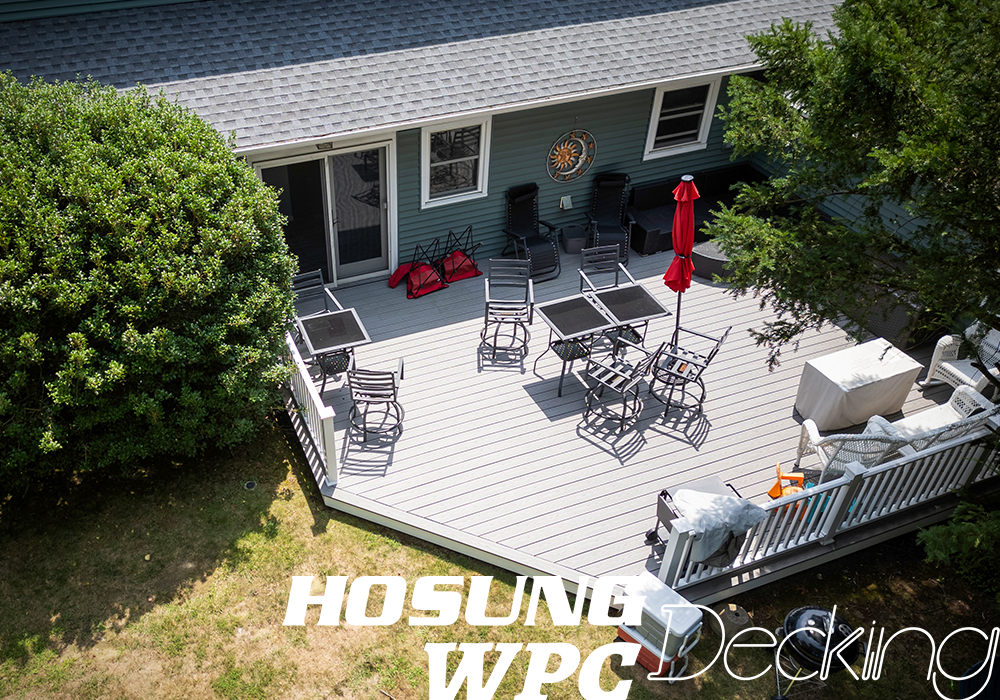
Ways to Save on Composite Decking
Building a composite deck in Canada doesn’t always have to break the bank. With a few strategic choices, you can reduce costs without sacrificing quality.
1. Choose a Basic Design
Stick with a simple layout. Straight-line decks are easier and faster to install than custom designs with curves or multi-tier levels. Avoid excessive built-ins and choose standard railing systems to keep the project affordable.
2. Buy During Seasonal Promotions
Decking retailers often offer discounts during the off-season (late fall to early spring). Planning ahead and purchasing materials before the peak season begins can lead to significant savings.
3. Consider Partial DIY Work
Even if you hire professionals for framing and structural work, you might be able to complete simpler tasks like installing decking boards or railings yourself, saving money on labor.
4. Compare Multiple Quotes
Get at least three estimates from different installers. Be sure each quote includes materials, labor, delivery, and additional costs. This will help you understand the market rate and identify the most competitive option.
5. Reduce Accessories
Limit features like lighting, complex railing systems, and decorative inlays, especially if your primary goal is functionality over luxury. You can always add enhancements later.
Is Composite Decking Worth the Investment?
From a long-term perspective, composite decking is a sound investment for most Canadian homeowners. Its initial cost is higher than wood, but the value lies in its durability, performance, and minimal maintenance. With a lifespan often exceeding 25 years and warranties to match, the reduced need for upkeep, staining, and replacement saves time, money, and effort over time.
Additionally, composite decking enhances property appeal and may increase home resale value, particularly in areas where outdoor living is in high demand.
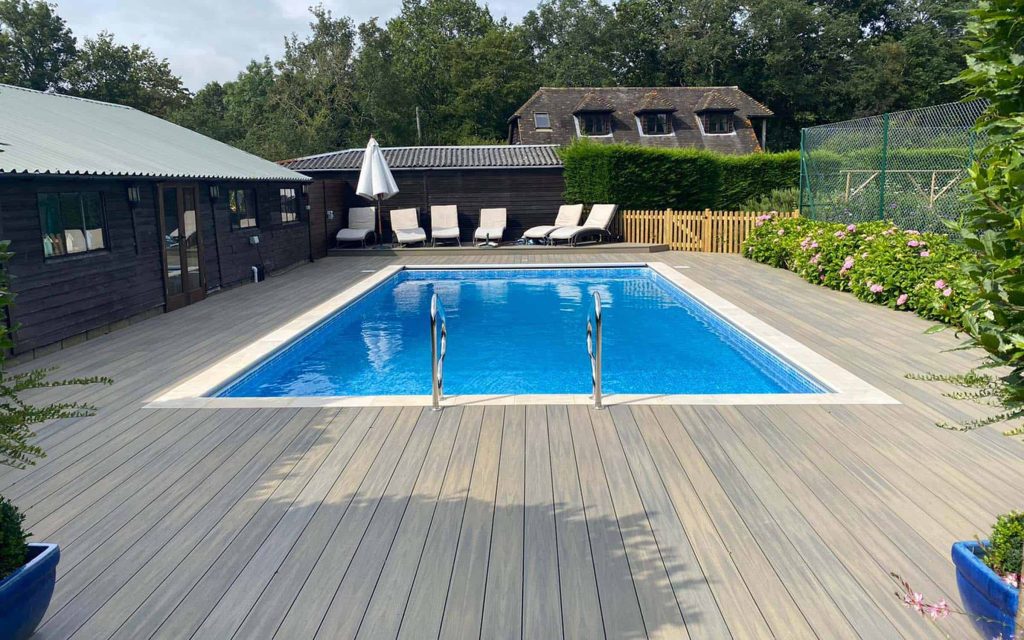
Where to Buy Composite Decking in Canada
Composite decking materials are widely available across Canada through home improvement stores, building material suppliers, and decking specialists. Many suppliers offer delivery services across provinces and may include design support and fastener systems as part of the package.
When purchasing, always request product samples, verify warranty details, and ensure your supplier complies with Canadian building code standards.
Final Thoughts: Choosing the Right Composite Decking Solution
The composite deck price in Canada depends on a variety of factors—from materials and installation to design, location, and extras. While composite decking may seem expensive compared to traditional wood options, the benefits of long-term performance, visual appeal, and reduced maintenance costs often outweigh the initial investment.
Before starting your deck project, take time to research your options, consider your long-term needs, and plan your budget accordingly. Whether your vision is a cozy backyard retreat or a multi-level entertaining space, composite decking offers the strength and style to bring that vision to life.
For homeowners and contractors seeking a high-quality and eco-friendly composite decking option, Hosung WPC offers a wide selection of durable and sustainable wood-plastic composite products that meet the needs of Canadian climates. Their commitment to quality and innovation makes them a trusted supplier in the composite decking industry.

